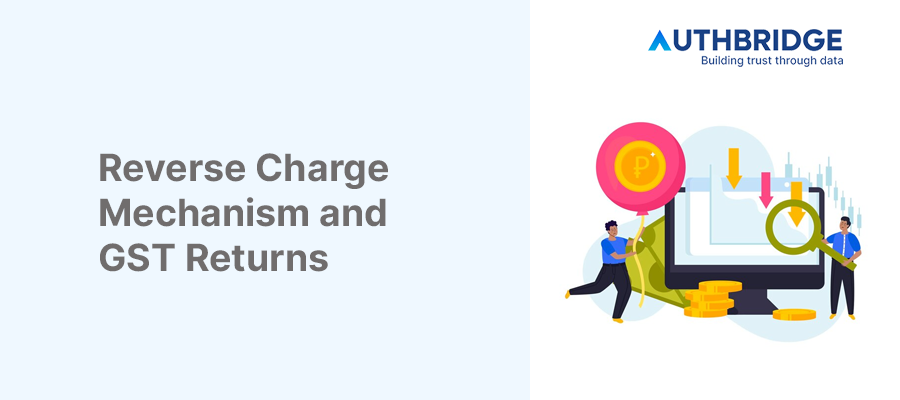RCM For GST Returns: A Step-by-Step Guide

The Goods and Services Tax (GST) revolutionized the Indian tax landscape, aiming for simpler tax administration. However, the concept of the Reverse Charge Mechanism (RCM) can add complexities for businesses. This comprehensive blog delves deep into RCM, its application in GST returns, and crucial considerations for businesses to ensure seamless compliance.
Understanding RCM: A Shift in Responsibility
Under the standard GST regime, the supplier is responsible for collecting and depositing GST with the government. However, the RCM flips the script, making the recipient of goods or services liable to pay GST instead of the supplier. This mechanism aims to plug potential loopholes and ensure tax collection, especially when dealing with unregistered dealers or imports.
Common Scenarios Triggering RCM:
- Imports: When a registered dealer imports goods, they become liable to pay GST under RCM, regardless of the supplier's registration status. (Source: https://www.cbic.gov.in/)
- Supplies from Unregistered Dealers: When a registered dealer purchases goods or services from an unregistered dealer, they are obligated to pay GST under RCM. This discourages tax evasion attempts by unregistered businesses.
- Specific Services: Certain services, such as those provided by directors to their companies or legal professionals to their clients, are subject to RCM under specific conditions outlined in the GST Act and notifications issued by the GST Council. (Source: https://gstcouncil.gov.in/)
Impact of RCM on GST Returns:
Both the supplier and the recipient are affected by RCM in their respective GST return filings:
- Supplier: Although not responsible for collecting and paying GST under RCM, the supplier must still report the supply in their GSTR-1 (outward supplies) return. They must clearly mention the transaction as an RCM supply to avoid discrepancies.
- Recipient: The recipient, now liable for GST under RCM, needs to reflect the transaction in their GSTR-3B (monthly return) by adding the GST amount payable under the "tax liability on reverse charge" section. They can also claim Input Tax Credit (ITC) on the GST paid, subject to eligibility and adherence to specific conditions.
Crucial Considerations for Businesses:
- Accurate RCM Identification: It's vital to accurately identify situations where RCM applies to avoid potential tax liabilities and penalties. Consulting a tax professional is highly recommended if you are unsure about the applicability of RCM to your specific transactions.
- Recipient Liability: Remember, even if the supplier doesn't collect GST under RCM, the recipient remains responsible for paying it. Failing to do so can attract penalties and interest charges.
- Documentation for ITC Claim: Proper documentation is essential for claiming ITC on RCM supplies. Ensure you have valid tax invoices from the supplier mentioning the applicability of RCM and clearly stating the GST amount.
Beyond the Basics: Additional Insights
- Advance Payment and RCM: If a registered dealer makes an advance payment for goods or services subject to RCM, they are liable to pay GST on the advance payment at the applicable rate. This needs to be reflected in their GST return.
- RCM and E-way Bills: When transporting goods subject to RCM, an e-way bill is mandatory if the value of the consignment exceeds Rs. 50,000. However, the supplier is not responsible for generating the e-way bill; the recipient, now liable for the tax, becomes responsible for obtaining it. (Source: https://www.gst.gov.in/)
Staying Informed and Seeking Guidance:
Staying informed about the latest changes and updates related to RCM and GST is crucial for businesses. Additionally, seeking professional guidance from tax advisors can be highly beneficial, especially for navigating complex scenarios and ensuring accurate tax filing. This can help businesses avoid potential complications and penalties, ensuring smooth GST compliance.
Conclusion:
Understanding RCM is a crucial aspect of GST compliance for businesses. Recognizing RCM scenarios, correctly reflecting such transactions in GST returns, maintaining proper documentation, and staying informed are essential for smooth compliance and contributing to a robust tax ecosystem in India.
Category

Abhinandan Banerjee
(Associate Manager - Marketing)
Abhinandan is a dynamic Product and Content Marketer, boasting over seven years of experience in crafting impactful marketing strategies across diverse environments. Known for his strategic insights, he propels digital growth and boosts brand visibility by transforming complex ideas into compelling content that inspires action.



